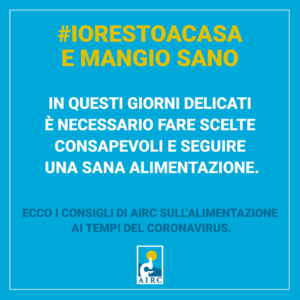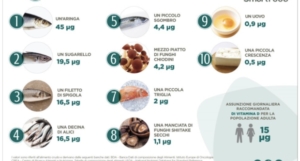With the exception of professional sportspeople and those paying particular attention to their physical well-being, these weeks of restrictions due to the Coronavirus have led to a state of inactivity. Stay at home is not only advisable, it’s what present government decrees impose, excluding only emergencies and first necessities. Ordinarily, even people not actually in the habit of exercising inevitably perform movements and small actions in their daily professional and social activities (climbing stairs to get to their offices, doing the shopping, strolling in the city centre, going out with friends in the evenings). They can’t be considered rudiments of sport, but they count for something. Now, not even those actions are carried out. It would of course be enough to exercise a bit at home or do a few domestic activities, but this doesn’t necessarily happen. In this period of inactivity, the AIRC Foundation for Cancer Research comes to our rescue with a few suggestions about our diet starting from two questions: do we need to change what we eat? can some of the food ingredients help prevent the Coronavirus infection? “It’s important to keep ourselves informed – the AIRC claims – but more time we spend in front of the screens and more likely it is that we come across false, confused or inaccurate news. Among them, some are about food”.

Image from AIRC’s Facebook page.
Even if we can’t have definitive answers given that the virus and its pandemic are unprecedented and the knowledge we have about them is still very limited, AIRC can nonetheless provide some guidance. The first is not to panic shop impulsively and needlessly stockpile (the goods of first necessity are guaranteed, as the Italian Prime Minister has reiterated more than once); on the contrary, we have to be extremely considered in buying food, since in this period our energy needs have mostly been reduced. “We have to remember – the Foundation explains – that a healthy diet starts with a responsible shopping, which, together with appropriate habits and behaviours, can contribute to keeping our organism stronger and therefore better equipped to fight off a possible infection”.
Let’s therefore start with the first question: what are the key items in a healthy and responsible shopping list? Fruit and veg, obviously. “Our recommendation – the AIRC says – is to consume 5 portions of fresh food a day, possibly of different colours”. We have to take any opportunity to eat fruit and vegetables: as condiment or side dishes, as snacks (in particular for children) or as ingredients in preparing other dishes.
Talking about proteins instead, the non-profit organisation tells us that they must be alternated: animal and vegetal, with a preference for the latter. “Stocking up on meat, either fresh or processed, is not justified, – they argue – the most recent researches invite us to limit its consumption anyway, especially of the red variety, and to reduce to a minimum the intake of the processed one, like salami and cured meats. Red meat shouldn’t be eaten more than twice a week”. With regard to carbohydrates, the recommendation is to eat not only bread and pasta, but also grain cereals, spelt, barley and oat, which can be ideal ingredients for pasta dishes, soups or cold salads; whole flour must be chosen over its refined counterpart.
What should also be avoided or reduced to a minimum is the intake of simple sugars. “There’s no reason – they explain – why we should eat more sweets, snacks, cakes, biscuits or any other high sugar content foods, especially during a period of inactivity. An excess of sugars can lead to weight gain, and possibly to becoming overweight or even obese, with the subsequent increase in the risk of contracting chronic diseases. We can indulge ourselves with little treats, as long as we don’t exaggerate”. As usual, common sense must prevail, even more so in this extraordinary situation. The recreational-educational aspect can also become important in a process of gaining awareness and responsibility, in particular with children. How? It could be by reading the labels on food products or cooking with them, literally getting them to knead the dough.
Moving on to the second key question: are there any foods, nutrients or supplements able to prevent the Coronavirus infection? The first answers seem to have arrived yesterday (26th March), with a press release by UnitoNews: a study conducted by professor Giancarlo Isaia, lecturer of Geriatrics and president of Turin’s Medical Academy, and Enzo Medico, ordinary professor of Histology, has highlighted a possible preventive and therapeutic role of vitamin D in relation to the COVID-19 pandemic (in their analyses, the two experts referred to the recommendations of the British Dietetic Association); drawing attention to the fact that in Italy lack of this vitamin affects a large percentage of the population, particularly the elderly. And the first preliminary data collected in the past few days in Turin seem to confirm it: patients hospitalised for the COVID-19 show evidence of a trend in rates of vitamin D deficiency.

Photo credit: UnitoNews.
As mentioned in the report of the research, a series of relevant responses in relation to this vitamin has been identified: an active role in the modulation of the immune system; the frequent association of vitamin D deficiency with numerous chronic pathologies that reduce life expectancy in the elderly, notably in the cases of COVID-19 infection; the effect of reducing the risk of contracting respiratory infections of viral origin, therefore the Coronavirus; the ability to contain the damage to the lungs due to hyper-inflammation: “In addition to the well-known general preventive measures*, – we read in the press release – our advice is to ensure adequate levels of vitamin D in the population, but mainly in subjects already infected, in their relatives, in health workers, in fragile elderly, in guests in assisted living, in people living in seclusion, and in all those who for various reasons are not regularly exposed to sunlight”. One issue was obviously immediately raised: vitamin D is synthesised by the body through sunlight exposure, and the current restrictions limit this from happening. “To compensate for this common vitamin deficiency – they therefore specified – we can simply expose ourselves to sunlight on our balconies and terraces, consume foods rich in vitamin D and, under a doctor’s guidance, assume special pharmaceutical products”.

